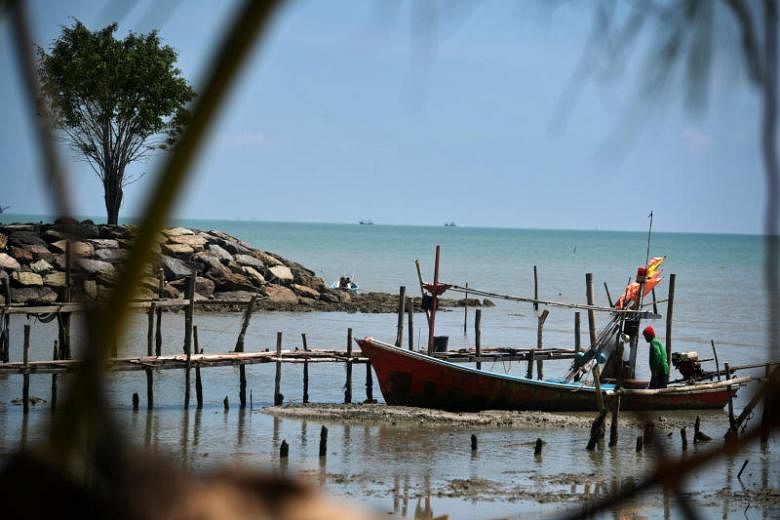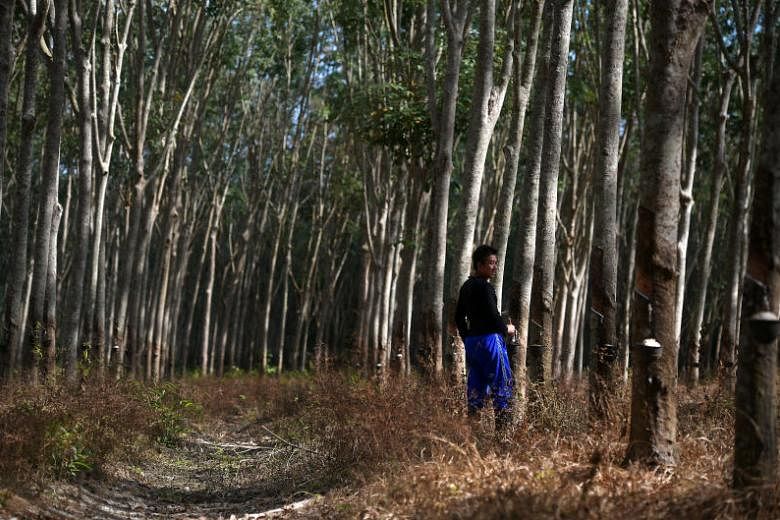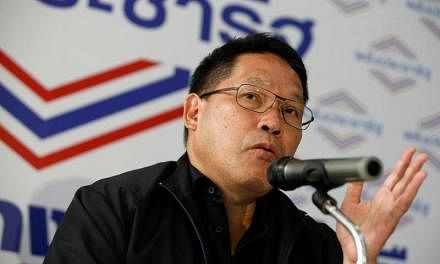NAKHON SI THAMMARAT, UDON THANI, AND BANGKOK - Downtown Nakhon Si Thammarat is quiet on a weekday evening and restaurants sit empty awaiting custom. The southern Thai province, devastated in parts by tropical storm Pabuk earlier this year, is struggling to keep its rubber and fishery industries alive.
Trying to tighten their belts are people like Mr Narong Srirodon, who keeps a second job as a factory worker because income from his 1.6-ha rubber plantation is too meagre to support his family.
"The past five years have been miserable, though this government has described it otherwise," he told The Straits Times. His 18-year-old son quit school last year. "He struggled with his studies and we didn't have enough to send him for extra tuition."
South-east Asia's second largest economy is firing up as the country nears its first election since the 2014 military coup. Its gross domestic product expanded by 4.1 per cent last year, the fastest pace in six years.
Central bank data shows that private consumption in January grew by 3.3 per cent from a year before, while private investment that same month expanded 2 per cent (year on year). But peek under the hood and key sections of the population still appear to be struggling, making bread and butter issues a key factor in this election.
Depressed farm prices after the 2014 coup coincided with a period of fiscal austerity as the military government withdrew the generous rice and rubber subsidies offered by the previous civilian administration. Household debt remained stubbornly high at about 78 per cent of GDP last year.
There has been little improvement in equality over the past five years, according to economist Duangmanee Laovakul from Thammasat University. In 2017, the top 10 per cent of households earned 19 times the income - and owned 375 times the value of assets - of the bottom decile of households.
"This inequality has accumulated over a long time and we don't have a policy to solve it," she told ST.
A new inheritance tax law, as well as land and buildings tax introduced under this government would have little effect at reducing inequality, because it has too many exemptions, she adds. The inheritance tax, for example, does not kick in for assets worth less than 100 million baht (S$4.3 million).
Meanwhile, Thailand simply has too many agriculture workers in an unproductive sector. Dr Viroj Na Ranong, an economist at the Thailand Development Research Institute, says inequality is expected to worsen over time unless enough farmers quit. While 30 per cent of its labour force works in agriculture, the sector generates just 8 per cent of the country's GDP.
"The staple prices will remain competitive worldwide, at a low level. Moving to high-valued crops, while desirable, would not able to help much, since their markets… are rather small and unlikely to expand at a high rate in a foreseeable future," he told The Straits Times.
In face of stiff competition from other farming countries, Bangkok has been short on ideas, he said.
"The current government's measures are the same as those of the former governments - albeit on smaller scales and with smaller budgets. And they tend to avoid the terms like 'crop mortgage' or 'price support'," he said.
This fact has not been lost on farmers, who look back fondly at the period when former prime minister Thaksin Shinawatra stimulated rural economies through various schemes like million-baht village funds, from which locals could draw loans.
"The current government and Thaksin's government are similar," says Ms Lamduan Namkot, 62, a rice farmer from Udon Thani province. "Both have helped me."
Under Thaksin's government, she borrowed 30,000 baht from the village-fund scheme. Last year, she borrowed 50,000 baht from the Bank for Agriculture and Agricultural Cooperatives, a state enterprise.
In the lead-up to March 24 election, Prime Minister Prayut Chan-o-cha, who has been nominated to return as premier by the Palang Pracharath Party, has plugged the rural achievements of his government. It helped thousands of famers switch crops, upgrade their skills and wrest back land titles they had been forced to surrender to loansharks after defaulting on repayments.
A centerpiece of its welfare policy is the Pracharat card, where the poor are given credits - topped up regularly by the government - to buy essential goods and services. The scheme has been criticised for limiting purchases to specific shops, reducing the impact it could have created by circulating money through the local economy.
In the fishing sector, recently imposed rules to rein in a multi-billion dollar industry long accused of exploiting migrant labour and overharvesting, are now being faulted for creating hardship on the ground.
In Nakhon Si Thammarat, small scale fisherman are fretting over rules they say were imposed too fast and without a proper understanding of local conditions. Small vessels now cannot venture beyond three nautical miles from the coast.
"Banana shrimp can only be found 20 miles from shore. Those within three miles are newly born and undersized," one boat owner, Mr Jareon Tohti-aeh, told ST. The new limits may destroy fishery habitats along the coast rather than protect them, he said.
Recalling the fishermen's panic, local politician Narisa Adithepworaphan, a candidate for the Democrat Party, said: "Everything came to stop suddenly and it is so devastating that people called me late at night asking for help."
Now, related businesses like local grocery or ice shops have shuttered, she said.
Mr Kamolsak Lertpaiboon, the Nakhon Si Thammarat-based secretary-general of National Fisheries Association of Thailand says he has sold all his four fishing boats and left the business altogether.
The government, which last month passed a new law to bring labour standards of fishery workers in line with the Work in Fishing Convention, appears unlikely to budge on fishery rules.
But rubber farmers may have better luck. In this election, the Democrat Party is pledging to support the price of rubber sheets at 60 baht per kg. Palang Pracharath - led by four of Mr Prayut's former Cabinet colleagues - is offering 65 baht.
Additional reporting by Kannikar Petchkaew












